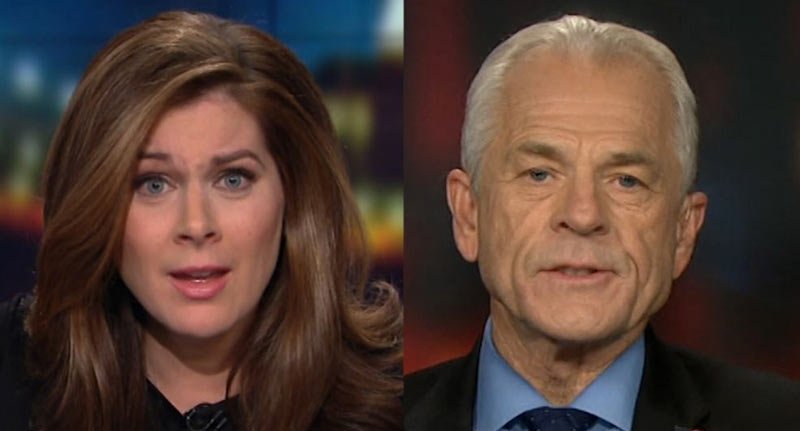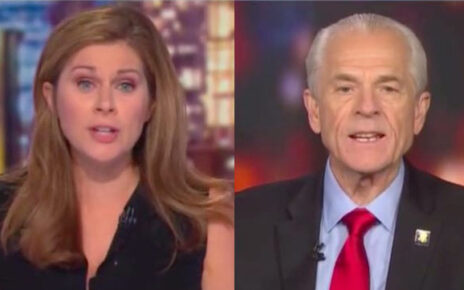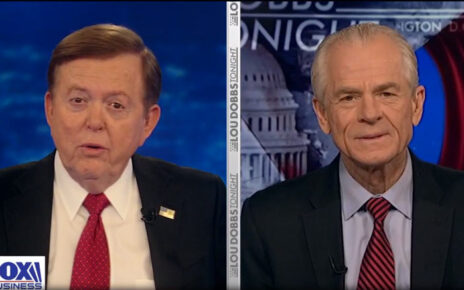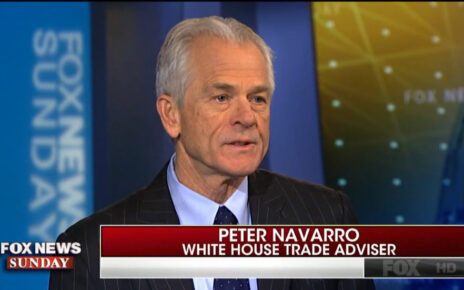McMaster To Resign As Trump’s National Security Adviser, Replacing Him With John Bolton; Top Trump Lawyer Quits Amid Russia Legal Team Shakeup; Dow Plunges Amid Fears Trump Just Started a Trade War; President Trump Announces Tariffs Against China. Aired 7-8p ET
THIS IS A RUSH TRANSCRIPT. THIS COPY MAY NOT BE IN ITS FINAL FORM AND MAY BE UPDATED.
OUTFRONT now, the director of the Office of Trade and Manufacturing Policy, Peter Navarro.
Peter, thanks so much for your time tonight. And as I said, the news moving so fast and furiously.
PETER NAVARRO, DIRECTOR, OFFICE OF TRADE AND MANUFACTURING POLICY: Indeed.
BURNETT: You know, you go from 724 points being the lead of the show, to make changes at the White House.
So let me just get you on the record to understand what’s happening there. Your reaction to the late breaking news on John Bolton coming in, and H.R. McMaster out as national security adviser. John Bolton apparently saying he didn’t expect this news to be announced today.
Do you have any sense as to why it was so sudden? Was this because of the leak about the Putin call or what?
NAVARRO: Here’s what I know — H.R. McMaster is a gentleman, a war hero, and a great individual, who I’ve gotten to know really well over the past 14 months working on foreign military sales.
He’s got a great staff. He’s a great individual. I know he will be missed. I’m not sure why today was the day to announce this, but he’s a great man, and he will be missed.
And John Bolton, I’ve gotten to know him over the years, and he’ll be a great replacement. So what we are seeing here is a president who has great judge of talent. And we are going to keep moving forward with the president’s agenda like we did today with this historic, historic decision to finally address China’s intellectual property theft and force technology transfer.
BURNETT: And I have a lot to ask you about that. First, let me just ask you, though, Peter, because you’ve been there since the beginning with this administration.
NAVARRO: Sure.
BURNETT: Right? You’ve been there. You’ve been loyal. You’ve been pushing these policies.
But I have to ask you, what is it like to work in this place where you have record turnover in any administration in this country, where a lot of people frankly are not competent in how long they’re even going to be in their jobs? How is it like to come to work there every day?
NAVARRO: It’s a wonderful honor and a privilege to come inside the perimeter here and create jobs on behalf of the president for the men and women in this country. And what I like in this environment to is a football team like the New England Patriots where they win their division every year with different set of players, and the only things that’s common really is the coach and quarterback.
2And here in the White House, the coach and quarterback are President Donald Trump. He’s a great man. And, listen, Erin, whatever you say, you can say that the first year of this administration, from an economic point of view strongest performances of any president not just in modern history but in history of the presidency. This was extraordinarily year.
And I had wished that people would pay more attention to the success of this administration. And it’s only going to get better. We have put in place tax cuts. We’re putting in place strong trade policies. We’re deregulating. We have — we are now an energy exporter which you and I know ten years ago would have never been dreamed about.
BURNETT: That’s true.
NAVARRO: So, it’s a great place to work at and it’s very — a dynamic, vital place, and it’s an honor to be here.
[19:50:00] BURNETT: Peter, you know, one thing that shocked me today when I looked — and, you know, you can talk about percentage drops and absolute point value drops. But when you look at the top 10 biggest drops for the market, four of them happened during the financial crisis, and four of them happened this year, and we’re in March.
So, you can talk about the performance of the economy, but the stock market has been rocked by things this president has done, including the tariffs that he announced today that you have so strongly fought for. He says they are completely just. Here he is today.
(BEGIN VIDEO CLIP)
DONALD TRUMP, PRESIDENT OF THE UNITED STATES: Anyway you look at it, it is the largest deficit of any country in the history of our world. It’s out of control.
(END VIDEO CLIP)
BURNETT: So, the market fell 724 points on those tariffs. China’s threatening to retaliate. Its embassy in the U.S., as you know, Peter, is saying, quote, China is not afraid of and will not recoil from a trade war.
Are you willing to take a trade war on?
NAVARRO: So, let’s — let’s go back in time, Erin, when you and I used to work at another network and we did financial market analysis. And let’s just look at what happened. Yesterday, around the noontime, I was looking at the crawler. Dow was up 200 points, and we were seeing a notice on the crawler that the president was going to introduce tariffs on China. No big deal, market was out.
Now what happened then, well, the Fed chairman came on and announced three rate hikes before the end of the year. And then we had all the Facebook stuff and that rattled the tech stocks. So, this whole notion that somehow the tariffs were the reason why the market went down —
BURNETT: That was yesterday.
NAVARRO: Well, it’s just — but the Facebook thing just got worse when Zuckerberg was on. I mean, the point is, Erin, you and I both know —
BURNETT: Peter, you and I both know that the tariffs are the big reason the market fell 700 points. It could go up tomorrow, but let’s just be real.
NAVARRO: Yes, let’s be real then. Let’s look — I think the scenario now is very, very bullish. Erin, let me just make a case here.
BURNETT: OK.
NAVARRO: You know basically stocks run on expectation of a future stream of corporate earnings by basically cracking down on China’s I.T. theft and forced technology transfer, the outlook now of American corporations that have been stolen from by the Chinese, and going to China under really burdensome and unfair conditions are brighter today than they were yesterday. So, note that.
And then the second thing, I mean, this is going to be great buying opportunity. This is a normal deep. You’ve seen this stuff before.
But look at what we have in place. We’ve got tax cuts which are going to start to kick in, in force with additional investment and spending in ’18 and ’19. We’ve got the tremendous job by Mick Mulvaney at OMB, just amazing on deregulation. We have now a situation where we are exporting energy. We have very low-cost fossil fuel energy which is going to help our manufacturing base, and we are cracking down with tariffs on things like solar and washing machines, aluminum, steel.
And what’s happening? Prices aren’t going up. We are having investment flood into this country. We’re seeing foreign companies build washing machines here with American hands.
So, I’m nothing but bullish on this economy and the stock market I think is going to reflect it. Let’s not get too excited about today.
BURNETT: You mentioned — well, you know, and look, one day is one day. But you mentioned aluminum and steel, and you’ve been a purist on this issue for as long as I’ve known you, which as you point out goes many years, back and to other network and interviews. You believed in the steel and aluminum tariffs, part of why you joined this administration and you fought for them. You’ve been consistent.
So, when you say tariff, you mean a tariff on everybody, and you said that very directly here on CNN earlier this month. Here you are.
(BEGIN VIDEO CLIP)
NAVARRO: As soon as you start exempting countries, you have to raise the tariffs on everybody else. As soon as you exempt one country, then you have to exempt another country. And so, it’s a slippery slope.
(END VIDEO CLIP)
BURNETT: It’s such a slippery slope that we’re going down a black diamond. I mean, today, the U.S. Trade Rep. Robert Lighthizer, said the E.U., Argentina, Brazil, South Korea and Australia are now exempt from those tariffs. Canada is exempt from those tariffs. They’re the largest provider of both steel and aluminum. Mexico is exempt from those tariffs. More countries are coming.
How do you be happy with that?
NAVARRO: So, hang on — so, I’m ecstatic about this because this is the art of the deal —
BURNETT: About the exemptions?
NAVARRO: Yes, because here’s what’s going to happen, they’re temporary exemptions, conditioned on the ability of these countries to come to the table and give us more fair, reciprocal trade. I can assure you, if we don’t get a better deal within the context of NAFTA from Canada and Mexico and refigure this, we’re going to have something happen.
Now, I should tell you — this is an important thing — every country that is not facing tariffs that we’re going to negotiate with will face quotas, so that we protect our aluminum and steel industries.
And, Erin, I would just put this out as a rhetorical question because the debate —
BURNETT: So, wait, let’s be clear — Canada is going to be punished in some way?
[19:55:02] NAVARRO: It’s not a question of punishment. Let’s look —
BURNETT: But, I mean, you’re saying, there’s no tariff, but they’re not going to be able to export as much as they want. There’s a quota, just to be clear.
NAVARRO: Yes, for all countries, there has to be a quota, because, Erin, if you don’t put a quota on, then any country that can do whatever they want will become a transshipment point for every other country. So, that’s clear. And Ambassador Lighthizer, who I think is probably the toughest, smartest guy that’s ever sat as the United States trade representative, will negotiate that on behalf of the toughest, smartest president in terms of this.
But let me say this, the question over steel and aluminum tariffs really boils down to whether you want to have a steel and aluminum industry. The president says we can’t have a country without them. I happen to agree very strongly with that. And if we’re going to defend those industries from what’s been a surge of imports, the only choice we have really is a tariff regime.
BURNETT: OK.
NAVARRO: And that’s good for America.
BURNETT: All right. Well, Peter Navarro, I appreciate your time. Great to talk to you again and I appreciate it.
NAVARRO: Great to see you again. Bye-bye.
BURNETT: All right.




